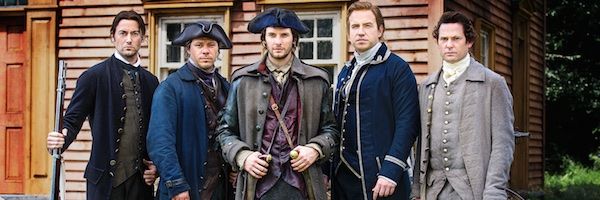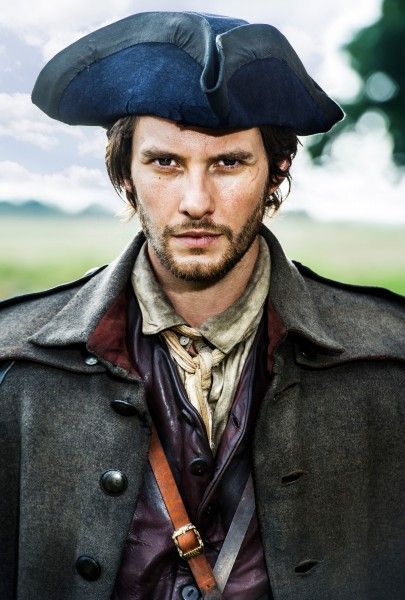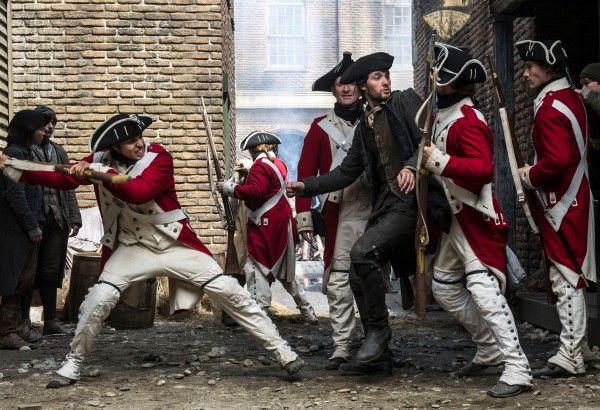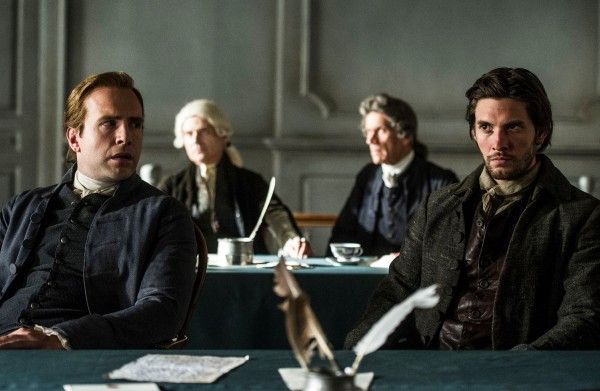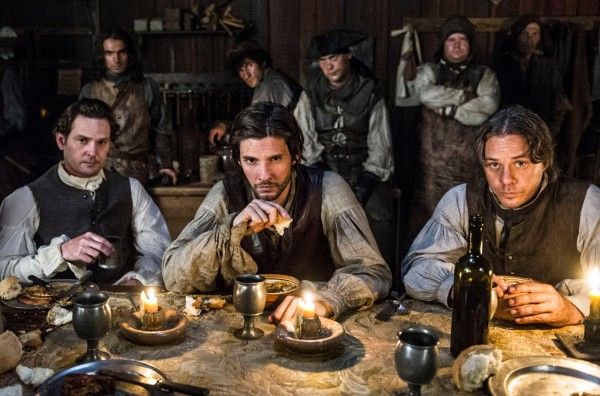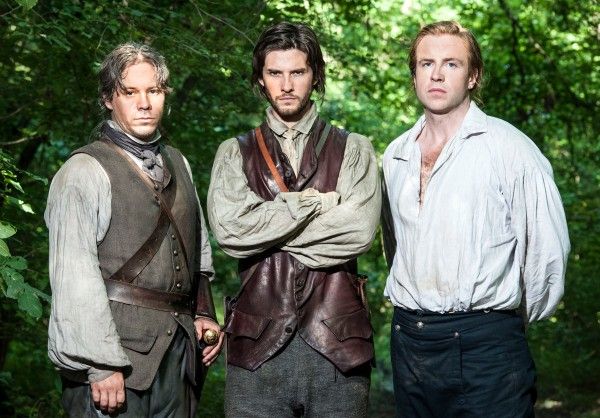The History mini-series Sons of Liberty is a three-night, six-hour event that follows a defiant and radical group of young men who band together in secrecy to change the course of history and make America a nation. Sam Adams (Ben Barnes), John Adams (Henry Thomas), Paul Revere (Michael Raymond-James), John Hancock (Rafe Spall) and Dr. Joseph Warren (Ryan Eggold) were from varied backgrounds, struggling to find purpose in their lives, until they sparked a revolution and became legendary.
During this exclusive phone interview with Collider, actor Ben Barnes talked about why this world lured him in, that he was hesitant about doing TV before now, taking on such an iconic figure in American history, the personal connection he feels to Sam Adams, working with such a talented ensemble of actors, why this production was magical, and that he always tells himself that he shouldn’t do another period fantasy or historical project, but that they tend to be interesting stories, so he takes them on anyway.
Collider: What attracted you to Sons of Liberty and made you want to be a part of it?
BEN BARNES: It reads a little bit like it watches. It read in a very visceral, rough-and-tumble, spirited way. I sat down to start reading it, to decide whether I wanted to do it or not, not really knowing about that period of history, and I read all three episodes in one go, without eating. I think I took a break between nights two and three to go to the toilet and try to make a cup of tea, and I realized it was about three o’clock in the morning. I was just engrossed in it. I’m used to reading scripts which are 90 to 110 pages long, and this was three times that. It was a world that lured me in. I’ve done a lot of period and fantasy things, but never anything that’s historical. Most actors are drawn towards historical tellings because it’s one of the most simple forms of storytelling. There was just something really exciting about the opening sequence, with this Spider-Man-esque figure, running across the rooftops. And then, you get to these landmarks of the Tea Party and the massacre, and going up to the war itself, and the first meetings in the Philadelphia statehouses. The third episode builds in a much more political way and a much more real, violent way. That goes hand-in-hand. And I liked that the story goes two directions. You have this crossroads mentality, with a group of very defiant, radical young men with ideas for equality and ideology, and wondering who they are, but none of them really have sparked the idea of revolution yet. What’s interesting about it is that it’s a group of young men whom I didn’t know had ever been in the same room, at the same time. ‘Cause I’m a Brit, you think, “If three of them were presidents, they can’t all have been around at the same time,” but they were. Just the idea that they were all heading towards the same goals, but had absolutely different ideas of how they were to get there, and the fact that they had to debate and persuade and fight, even within their own ranks, to settle on an agreed structure for the fight for independence, that created inner tensions in the characters and between the characters. I just thought that the whole thing together was irresistible, really.
This is the first time people will be seeing you on American television. You’d previously done a pilot, but that didn’t get picked up. Were you looking to get involved with TV projects, and are you looking to do more of that?
BARNES: It’s something that I had been hesitant about, a few years ago. But, I’m always a bit slow to catch on to trends. Even when I was at school, I was never the first one to catch on to what was happening. For example, I’ve only just gotten onto Facebook, and that’s 10 years late. It’s a good example of how far behind I am. I love television. I’m a huge Netflix-type binger of shows, and I get very, very invested. I was invested in just reading the script for this, so you can imagine what I’m like when I’ve got access to 22 episodes at one time. It was absolutely something I thought would be very cool, but you think about it differently because you have to really love the character in order to spend that amount of time with them and really believe in them. So, I’m absolutely open to working in any medium. I’ve spent six or seven months on plays before, which very few people see. But I think it’s very exciting that I’m on an American television for is playing one of the Founding Fathers of the country. That’s a good step forward for me. I’m actually weirdly more excited about this being on people’s televisions than I am about a film coming out, which people have to go to see, and make a choice to go and see. Obviously, they have the choice to watch that particular channel or not, but at the same time, I am very excited about it because, even if their televisions are off, I know it’s playing. There’s something quite exciting about that, I suppose because it’s fresh and different for me.
Were you ever hesitant about taking on such an iconic figure in American history?
BARNES: A little bit, initially. I thought, “Is anyone going to bolt at a Brit playing such an iconic American figure?” But then, I thought, “People don’t really know much about him and his life.” I was also on a team with Rafe Spall, who is the wonderful actor that played John Hancock. He’s also English, playing another American Founding Father. The others were all genuinely American. He and I were the defectors, and it was encouraging to have a teammate in that. We made a conscious decision to have the Americans sound American and the Brits to sound British, and I think that was a simple choice made by the studio, just to make things clear. They wanted to be very clear that the mission of this project was to have that version of history with the bar fights left in. They would scamper across rooftops like superheroes, but there would also be elements straight out of the various participant biographies thrown in for the build up to the Revolution. They specifically said to me that the intention was not to make a documentary. They also wanted things to be accurate, but feel like a group of spirited young men. I went to Boston to see the Sam Adams statue there, and on the side of the statue, it says, “A statesman, incorruptible and fearless.” That, to me, just summed it up. That’s what they wanted to bring out of all these characters. It was about that youthful exuberance, the secrecy of everything, and the build up of everything, and they wanted to make it exciting.
After you do the research and you spend six hours of TV time playing this character, what’s it like to then learn that a time capsule likely buried by Sam Adams and Paul Revere was recently discovered?
BARNES: It was very funny ‘cause I was reading it going, “Oh, my god, they found a time capsule and they think Paul Revere and Sam Adams were involved in the planting of it.” And my roommate was like, “What’s in it?” And I said, “I’m not sure. They’re going to x-ray it, but they think there will probably be coins and documents.” And he just looked at me and did an eyebrow raise and said, “That’s very convenient. It’s the History Channel, isn’t it?” And I was like, “No, it’s not the History Channel that planted it there. I don’t think they have that much power.” But it was very, very trippy. He’s a very cynical human being. The timing was immaculate.
Do you feel a bit of a personal connection to Sam Adams, after all of the research you did?
BARNES: Absolutely! Every time I see someone drinking a Sam Adams beer, I’m looking at them as if they’re going to recognize me, which of course, they won’t. They wouldn’t even from the bottle because a little tidbit from the bottle is that it’s actually Paul Revere on the label of Sam Adams beer since he apparently was better looking.
At what point do you think Sam Adams really realized he was more than just a rebel and an instigator and was really heading a revolution that would change America?
BARNES: Well, that was actually one of the first questions that I asked our writers when I first got there because I was struggling with the clarity of when that moment was. The idea is that he finds himself in this position, by virtue of the actions of the people who became his friends and colleagues. He finds himself thrust into the position of leader. He doesn’t really choose that. He had these charismatic qualities that people wanted to follow, and he was always in the fight for equality, but in real life, he was a much more religious man. He was tempted into the idea of the priesthood and was being pushed that way by his father, but then made an active decision not to do that. He was quite manipulative in his own way, as well. People didn’t know that they were necessarily being oppressed because they didn’t know any different. They didn’t realize that there was inequality. I think it took this band of revolutionaries to point out to the people that there is a better way, and they only really got involved once it was pointed out. That’s something that I found, in looking at rebellions and revolutions around that world.
Much like the characters that make up the Sons of Liberty, this group of actors is very diverse and you’re all from different backgrounds. What was it like to work with your co-stars?
BARNES: I have to confess, I wasn’t very aware of many of the cast before we started. Obviously, I’ve watched Breaking Bad, so I knew Dean Norris. He came in for the last couple of weeks with this naughty twinkle in his eye and had Benjamin Franklin very much in his pocket, ready to go, which was lovely to see and a lot of fun. I wasn’t really that aware of any of the others, but I was very pleasantly surprised, at every turn, how well everybody suited their characters. I had only a few weeks before we started, so I didn’t have a chance to Google everybody and work out who they were. I’d heard of Rafe Spall before. Working on the bromance with him, in terms of those characters, was very rewarding, as I’d hoped it would be when I was reading it. And I thought Michael Raymond-James just brought a real vigor to Paul Revere, we just didn’t have as many scenes together as I would have liked. Because we were all banded together in Romania, eating in the same restaurants, and working on the same scenes at night, the bonds of kinsmanship were formed, even if we didn’t have that many scenes together. So, when Paul Revere comes to warn Sam Adams about the redcoats’ arrival, or the movement of the troops, you feel that they know each other. You know that they have these connections, even though you haven’t really seen them sit down and talk. It was the same with Ryan Eggold, who played Joseph Warren. And I had a great laugh with Emily Berrington, who played Gage’s wife Margaret, even though our characters are never in the same scene. It was lovely to hang out with all of them.
What can you say about General Gage (Marton Csokas) and the type of adversary he is?
BARNES: Marton is a very considered, well-spoken man with a huge amount of gravitas. Even though, in real life, he’s got a very gentle demeanor, you know he can absolutely pull out this kind of power, if he needs it. That’s just what he gives off, in real life. I wish I gave off any of those things, in real life, but he just does. It’s quite magnetic to be around. You want to hear his stories and you want to be around him. He and Sam Adams never speak, on screen. They share one look. But, I still think you feel that antagonism between the two characters. He just dials up or dials down all of these very natural qualities, and I think that people who were in the scenes with him were genuinely quite frightened of him. You need a powerhouse like that in this, otherwise you don’t feel the tension, the struggle and the opposition there. He was in Massachusetts. And then, you had the larger enemy of the British. And then, there were these ideas about independent nations and bringing the states together to be the United States. And then, there were personal relationships and struggles and dreams, as well. To have all of those things sewn together and connected is quite a feat for a writer. That’s what’s good about this. You don’t really feel like you’re watching something about too many different things. You feel like you’re on a train and it’s moving forward, which is always the hope.
Did you have to do any physical training for this or learn any new skills?
BARNES: I have a bit of a background with the horse riding and all of that business. We did a few quick little seminars about the shooting of the guns, but they really wouldn’t let me get that involved. Aside from Paul Revere, who was known for it, they didn’t really want to show the Founding Fathers as being violent criminals or murderers. I actually fought to make him a bit more like that. I think it’s always good to be pushing where the edges of a man are because that’s what people are interested in, but they were certainly careful not to misrepresent real historical and political figures.
Having shot such an epic story like this, where you’re in the period wardrobe and on these extravagant sets, what are your most memorable moments on this production?
BARNES: On set, when you’re not filming, there are usually a couple of moments that really ground you on the planet. In terms of acting while the cameras are rolling, I really enjoyed the intimate scenes I had with Rafe, when we were in a bar or a stockroom somewhere, and we were just talking and discussing scenes, and then filming them. That was really enjoyable, in terms of the job. There’s something magical to me about shooting at nighttime in a country on the other side of the world from your home. Also, there’s a reverence involved when you’re shooting something that’s based on truth. So, when we were all together, filming the Boston Tea Party, or in the Boston town square, shooting some of the chase sequences at nighttime, and the whole troupe was together, there’s just something very, very exciting about that process. A lot of people complain that night shoots are cold, but to me, it’s magical. It’s like when you’re a kid and you’re allowed to stay up late. It feels like that to me. Perspective hits home and you think, “I’m making this thing that’s going to be on the television, and I’m playing this interesting historical character, and it’s the middle of the night and we’re in Romania.” The excitement and adrenalin fuels you through the first couple of weeks and sometimes you forget to be present, and it takes a moment like that to really sink in just what you’re doing. And then, it feels very special. It was also partly because the sets we were on were so incredible. They were only wooden frames when we got there, and then literally two months later, we came back from filming on location and there was a 1765 Boston, in front of our very eyes. It was very, very impressive. That all adds to the magic, really.
Having played such diverse and interesting roles in your career, do you know what you want to do next?
BARNES: I’m always telling myself that it shouldn’t be a period fantasy or a historical thing because then people will pigeonhole me, but they do tend to be interesting stories and they do tend to come my way, so I do tend to take them on. I have several different projects coming up in the next couple of months, all of which have been quite diverse, so I’m very comfortable to continue down that path.
Sons of Liberty is a three-night event airing on History on January 25th, 26th and 27th.

